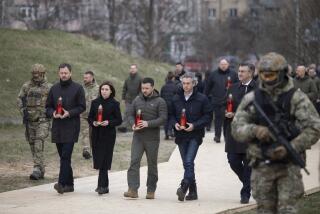Echoes of Bosnia in Iraq
- Share via
Bosnia, long gone from news reports, garnered some recent coverage when a government commission finally acknowledged that the Serb army had committed the worst massacre in Europe since World War II.
Bosnian Serb officials had ignored facts, mass graves and witnesses for years in denying involvement in the killing of as many as 8,000 men and boys in the Muslim town of Srebrenica nine years ago. The commission issued its report last week and Monday led forensic experts to a mass grave.
Serbian leaders took a step toward law and decency but shouldn’t expect much world applause until they also surrender indicted war criminals to stand trial on genocide charges.
The U.N.-established war crimes tribunal at The Hague is trying former Yugoslav President Slobodan Milosevic, who has proved adept at stalling the proceedings. At least he’s behind bars.
Onetime Bosnian Serb leader Radovan Karadzic and his top wartime general, Ratko Mladic, the leader of troops at Srebrenica, remain at large in Bosnia-Herzegovina or Serbia and Montenegro. They are still seen as heroes by many Serbs, and the governments of the two countries are unwilling to arrest them. For that they should face loss of international financial aid and any hope of joining the European Union.
What is too seldom remembered, however, is that there was also a time when Western troops let the Serbian generals roam free, out of fear that nabbing them would worsen violence.
What happened in Serbia now echoes in Iraq, simmering with ethnic and religious hatreds much like those that consumed Yugoslavia. The only thing currently uniting Shiites, Sunnis and some Kurds is the desire to be rid of the United States. Any act that serves to hurt U.S. interests can be seen as heroic.
Consider the story of Muqtada Sadr. His father, Shiite cleric Mohammed Sadeq Sadr, was assassinated in 1999 by Saddam Hussein’s agents. Today his son, a cleric himself, is virulently anti-American and the object of an arrest warrant on charges of involvement in the killing last year of a rival religious leader. His guerrilla forces have killed American troops and many Iraqi civilians. But U.S.-led forces have not arrested Sadr, realizing that a confrontation could provoke massive clashes with his followers. NATO forces occupying Bosnia delayed arresting accused war criminals for nearly two years for a similar reason.
Although most Shiites support another, more moderate, religious leader, Sadr’s popularity increased after his militias fought U.S. troops. Last week he changed his tune to say he would cooperate with the interim Iraqi government if it worked to end the U.S. military presence. He’s also considered a cinch to win a seat in a future government if he runs.
It will be up to Iraq whether to try Sadr, whose crimes do not compare to those of Serbian leaders. But his heroic reputation and the power that his raw violence has brought him are not good omens for such a divided land.
More to Read
Sign up for Essential California
The most important California stories and recommendations in your inbox every morning.
You may occasionally receive promotional content from the Los Angeles Times.










